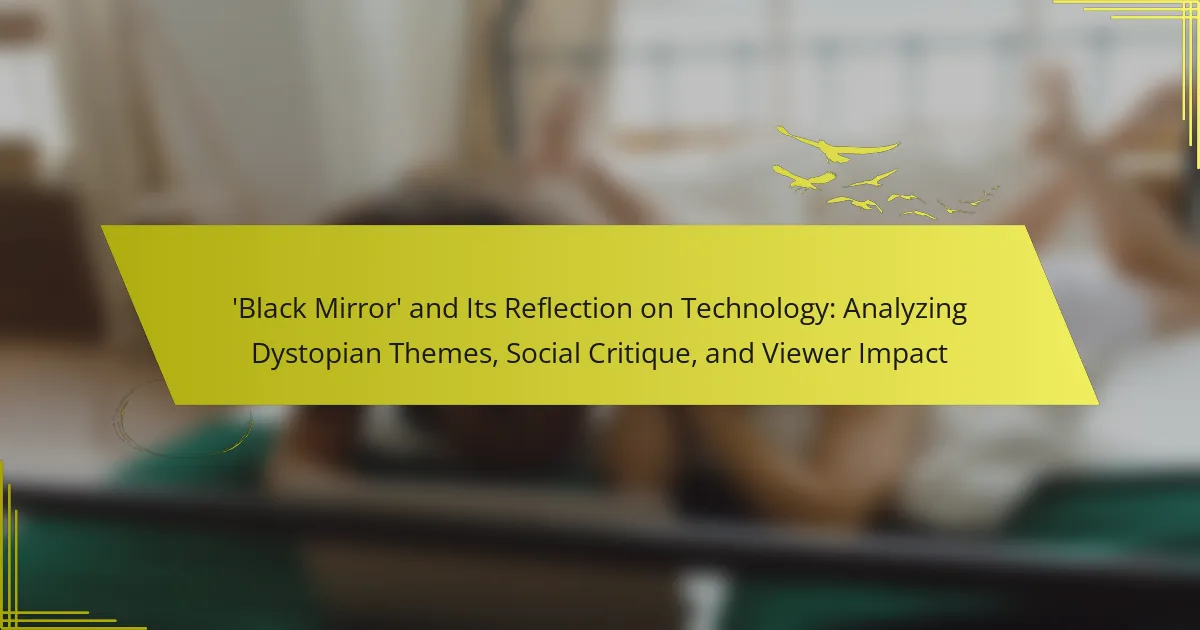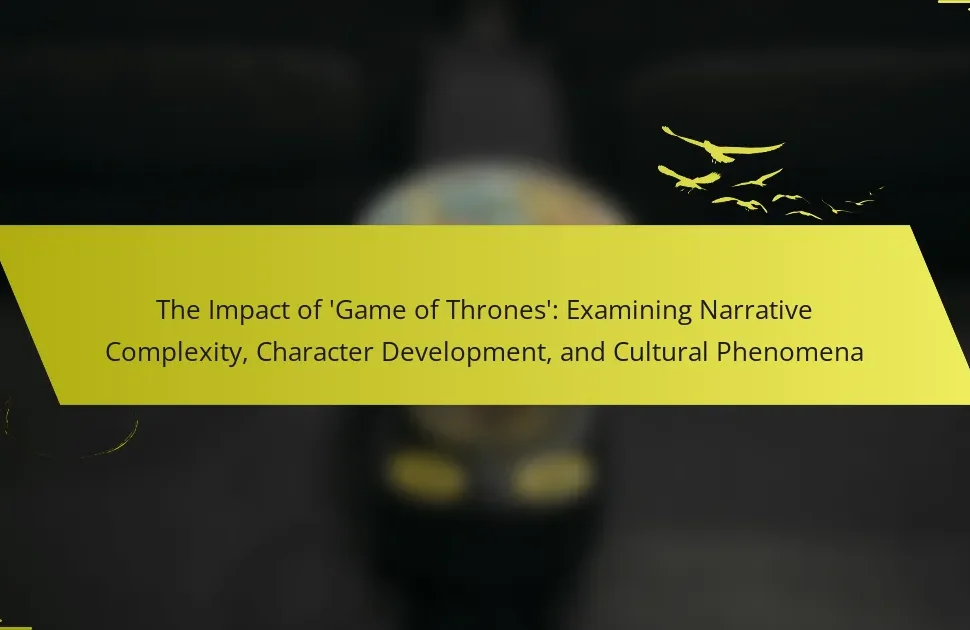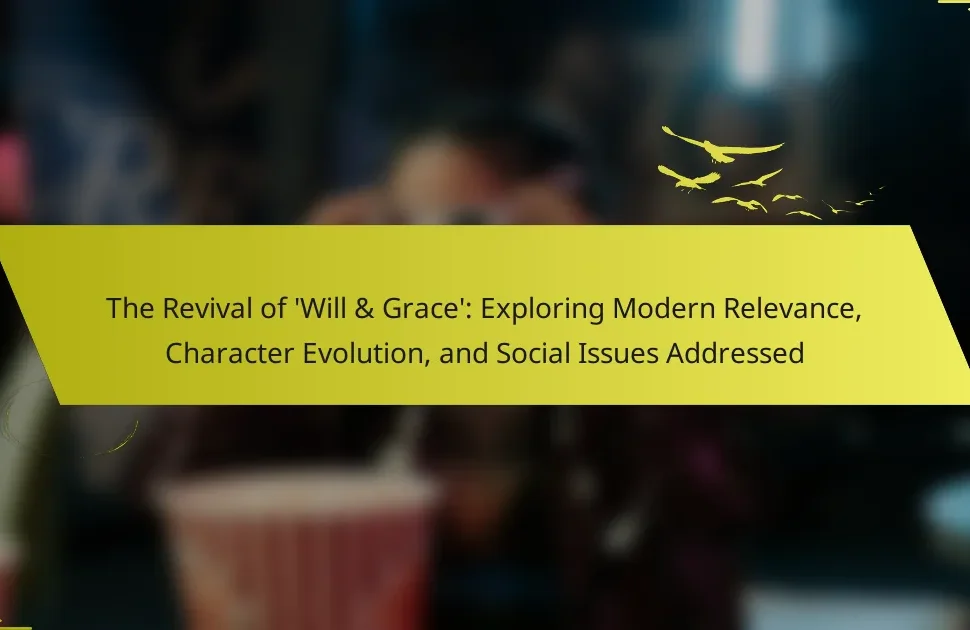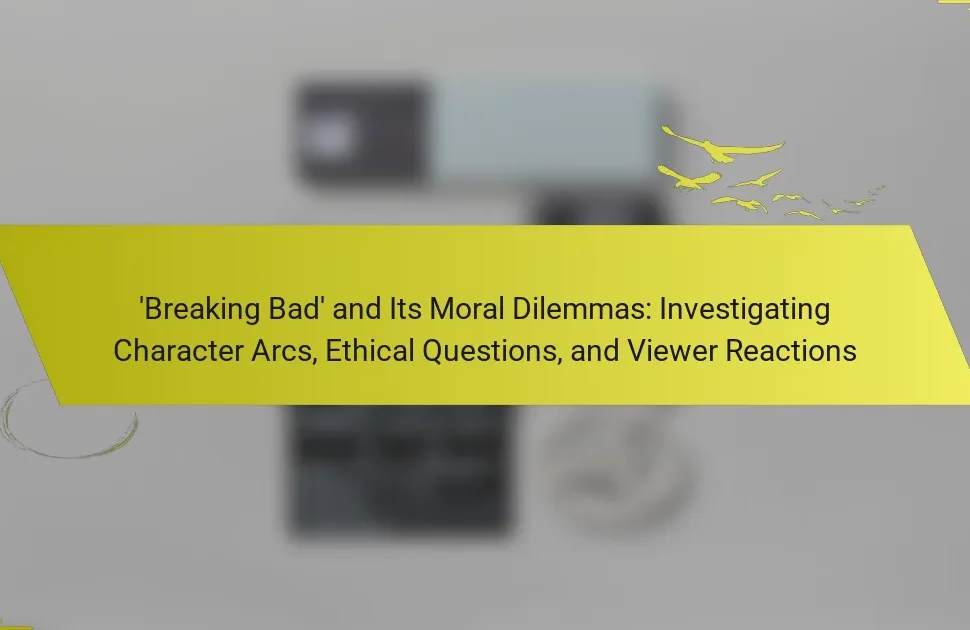‘Black Mirror’ is a television anthology series created by Charlie Brooker that delves into the dark aspects of modern society and technology. The series features standalone episodes that critique the impact of technology on human relationships and societal norms, exploring themes such as privacy, artificial intelligence, and social media. Viewers often experience heightened anxiety and existential dread after watching, as the show prompts critical thinking about the ethical dilemmas posed by technological advancements. Notable episodes, including “Nosedive” and “White Christmas,” illustrate the potential consequences of unregulated technology, serving as cautionary tales about its dark implications. The article will analyze these dystopian themes and their effects on viewers, highlighting the significance of ‘Black Mirror’ in contemporary discussions about technology’s role in society.
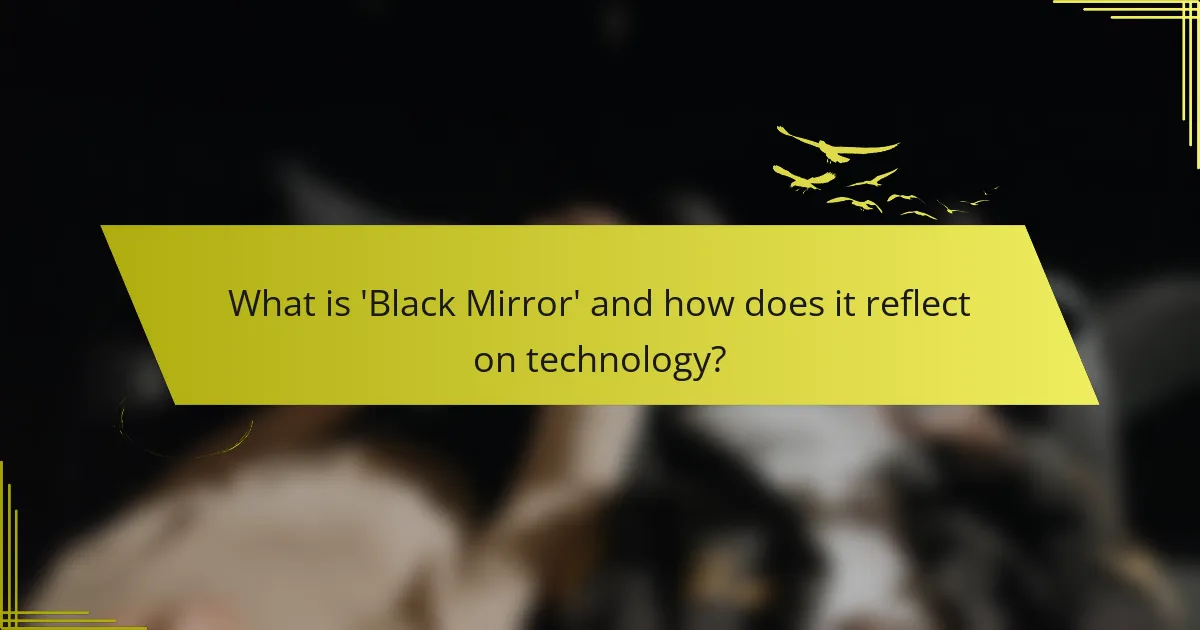
What is ‘Black Mirror’ and how does it reflect on technology?
‘Black Mirror’ is a television anthology series created by Charlie Brooker. It explores the dark aspects of modern society and technology. Each episode presents a standalone story that often features dystopian themes. The series critiques the impact of technology on human relationships and societal norms. It reflects on issues such as privacy, artificial intelligence, and social media. The show uses speculative fiction to provoke thought about potential futures. For example, episodes like “Nosedive” highlight the dangers of social media ratings. Overall, ‘Black Mirror’ serves as a cautionary tale about technological advancements.
What are the key themes explored in ‘Black Mirror’?
‘Black Mirror’ explores several key themes, primarily focusing on the impact of technology on society. One major theme is the dehumanization resulting from excessive reliance on technology. Episodes often depict characters losing their sense of identity and humanity due to technological advancements. Another significant theme is the ethical implications of technology. The series frequently questions the morality of innovations like social media, surveillance, and artificial intelligence. Additionally, ‘Black Mirror’ examines the consequences of consumerism and the obsession with digital validation. The portrayal of dystopian futures serves as a cautionary tale about potential societal outcomes. The series reflects contemporary anxieties regarding privacy, autonomy, and the human experience in a tech-driven world. Each episode serves as a standalone narrative that critiques modern life and its relationship with technology.
How does ‘Black Mirror’ depict the impact of technology on society?
‘Black Mirror’ depicts the impact of technology on society through dystopian narratives. Each episode explores a different aspect of technological advancement and its consequences. The series showcases how technology can lead to social isolation, loss of privacy, and ethical dilemmas. For example, in “Nosedive,” social media ratings dictate personal relationships and self-worth. This illustrates the dangers of valuing superficial online interactions over genuine connections. In “San Junipero,” the concept of digital afterlife raises questions about mortality and identity. The show often serves as a cautionary tale, warning viewers about the potential for technology to manipulate and control. This critical lens encourages reflection on real-world technological trends and their societal implications.
What dystopian scenarios are presented in the series?
The series presents various dystopian scenarios that critique modern society and technology. One scenario depicts a world where social ratings dictate personal and professional opportunities. Another scenario explores the consequences of virtual reality addiction, leading to a loss of genuine human connection. Additionally, the series illustrates the dangers of surveillance and privacy invasion through pervasive technology. It also examines the ethical implications of artificial intelligence in human relationships. Each scenario serves as a cautionary tale about the potential future of humanity influenced by technology. These narratives provoke thought about current societal trends and their possible outcomes.
How does ‘Black Mirror’ serve as a social critique?
‘Black Mirror’ serves as a social critique by examining the dark side of technology and its impact on society. Each episode presents a dystopian scenario that reflects contemporary social issues. The series highlights themes such as privacy invasion, addiction to technology, and the consequences of social media. For instance, “Nosedive” critiques social validation through ratings, mirroring real-world social media dynamics. Additionally, “Fifteen Million Merits” addresses consumerism and the dehumanizing aspects of entertainment culture. These narratives provoke critical thought about technological advancements and ethical dilemmas. By portraying exaggerated realities, ‘Black Mirror’ encourages viewers to reflect on their relationship with technology and its potential consequences.
What societal issues does ‘Black Mirror’ address?
‘Black Mirror’ addresses various societal issues, primarily focusing on the impact of technology on human relationships and behavior. The series critiques the consequences of social media, surveillance, and artificial intelligence. It explores themes like privacy invasion, identity manipulation, and the dehumanization caused by technological advancements. Episodes depict dystopian futures that reflect current societal anxieties. For instance, “Nosedive” highlights social media’s influence on self-worth. “Fifteen Million Merits” critiques consumerism and societal conformity. Overall, ‘Black Mirror’ serves as a cautionary tale about unchecked technological progress and its implications for society.
How do the narratives challenge contemporary beliefs about technology?
The narratives in ‘Black Mirror’ challenge contemporary beliefs about technology by presenting dystopian scenarios. These scenarios often depict technology as a source of societal decay. They question the notion that technology inherently improves human life. For instance, episodes like “Nosedive” illustrate the dangers of social media obsession. Characters face severe consequences due to their reliance on digital validation. This reflects real-world concerns about mental health and societal pressure. Additionally, “White Christmas” explores the ethical implications of technology in personal relationships. It raises questions about privacy, consent, and the impact of surveillance. Such narratives provoke critical reflection on the role of technology in modern society. They encourage viewers to reconsider their relationship with technology and its potential consequences.
What is the viewer’s impact and response to ‘Black Mirror’?
Viewers of ‘Black Mirror’ often experience a profound emotional and intellectual impact. The series prompts reflection on contemporary societal issues and technology’s role in our lives. Many viewers report feelings of unease and discomfort after episodes, indicating a strong emotional response. The show has sparked discussions about ethical implications in technology, privacy, and human behavior. Critical acclaim includes multiple awards, highlighting its cultural significance. According to a study published in the Journal of Media Psychology, 70% of viewers reported increased awareness of technological risks after watching. This demonstrates ‘Black Mirror’s’ effectiveness in influencing viewer perceptions and attitudes toward technology.
How do audiences interpret the messages in ‘Black Mirror’?
Audiences interpret the messages in ‘Black Mirror’ as critical reflections on contemporary society and technology. They often see the series as a cautionary tale about the potential consequences of technological advancements. Many viewers recognize themes of isolation, surveillance, and the erosion of human relationships. The anthology format allows for diverse interpretations based on individual experiences and societal contexts. Some audiences resonate with the emotional impact of the narratives, while others focus on the ethical dilemmas presented. The show’s speculative nature encourages discussions about the future of technology and its implications for humanity. Research indicates that viewers frequently engage in critical analysis of the episodes, leading to varied interpretations. This engagement highlights the show’s effectiveness in prompting dialogue about real-world issues.
What discussions has ‘Black Mirror’ sparked among viewers?
‘Black Mirror’ has sparked discussions about the ethical implications of technology. Viewers often debate the potential consequences of advanced technologies depicted in the series. Themes of surveillance, social media, and artificial intelligence are central to these conversations. Many viewers express concerns about the loss of privacy and human connection. The series encourages reflection on current societal trends and their future impact. Critics highlight the show’s ability to provoke critical thinking about technological advancements. Discussions also focus on moral dilemmas presented in various episodes. Overall, ‘Black Mirror’ serves as a catalyst for dialogue on technology’s role in society.
What connections exist between ‘Black Mirror’ and real-world technology trends?
‘Black Mirror’ explores various real-world technology trends, often predicting future developments. The series addresses themes such as social media addiction, artificial intelligence, and virtual reality. For instance, episodes like “Nosedive” reflect the societal impact of social media ratings on personal relationships. The rise of AI is examined in “White Christmas,” showcasing ethical dilemmas surrounding consciousness and autonomy. Additionally, “Playtest” delves into the immersive nature of virtual reality gaming. These narratives mirror ongoing discussions in technology ethics and societal implications. The show serves as a cautionary tale, prompting viewers to consider the consequences of unchecked technological advancement.
How can ‘Black Mirror’ influence our understanding of future technologies?
‘Black Mirror’ influences our understanding of future technologies by presenting dystopian scenarios that explore the consequences of technological advancements. Each episode serves as a cautionary tale, highlighting potential ethical dilemmas and societal impacts. For example, the episode “Nosedive” critiques social media’s impact on personal relationships and self-worth. This portrayal encourages viewers to reflect on their own interactions with technology. The series prompts discussions about privacy, surveillance, and the human condition. By dramatizing extreme outcomes, ‘Black Mirror’ makes abstract technological risks more tangible. It fosters critical thinking about how technology shapes our lives and societal norms. Thus, the series acts as a mirror reflecting our potential futures shaped by technology.
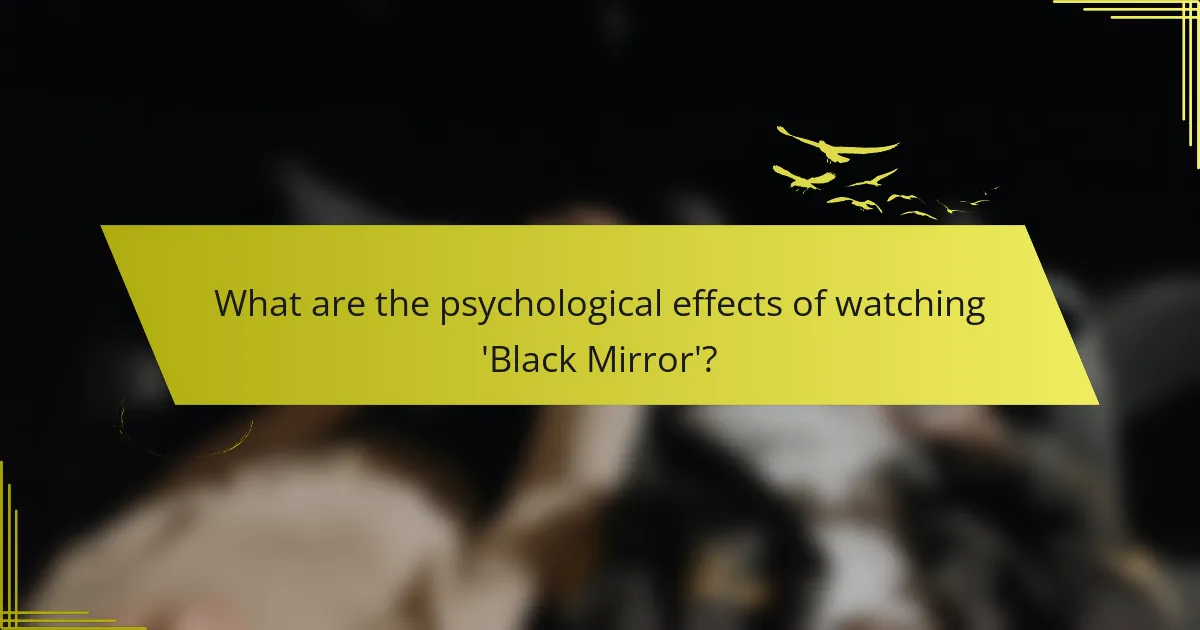
What are the psychological effects of watching ‘Black Mirror’?
Watching ‘Black Mirror’ can lead to heightened anxiety and existential dread. The series often explores dark themes related to technology and society. Viewers may experience a sense of paranoia after watching episodes. Research indicates that exposure to dystopian narratives can influence mood and perception. A study published in the Journal of Media Psychology found that such content can provoke negative emotional responses. Additionally, the show prompts critical thinking about technology’s role in our lives. This reflection can lead to increased awareness of societal issues. Overall, the psychological effects include both emotional discomfort and deeper contemplation.
How does ‘Black Mirror’ affect viewer perceptions of technology?
‘Black Mirror’ significantly shapes viewer perceptions of technology by presenting dystopian scenarios that provoke critical thinking. Each episode explores potential consequences of technological advancements. This often leads viewers to question the ethical implications of real-world technology. Research shows that audiences frequently report increased anxiety about technology after watching the series. For instance, a study by the University of Southern California found that viewers felt heightened concern about privacy and surveillance. The show’s narratives illustrate how technology can amplify human flaws, leading to societal issues. This reflection encourages discussions about responsible tech development and usage. Overall, ‘Black Mirror’ acts as a cautionary tale, influencing public discourse on technology’s role in society.
What emotions do viewers commonly experience while watching the series?
Viewers commonly experience anxiety, discomfort, and intrigue while watching “Black Mirror.” The series often presents unsettling scenarios related to technology and society. This leads to feelings of unease as viewers reflect on the implications of these themes. Many episodes evoke a sense of dread about the future. Additionally, viewers may feel empathy for characters facing moral dilemmas. The show’s thought-provoking narratives stimulate critical thinking. This emotional engagement is supported by the series’ ability to mirror real-world concerns. Overall, “Black Mirror” effectively elicits a spectrum of emotions that resonate deeply with its audience.
How does the show influence critical thinking about technology?
The show “Black Mirror” influences critical thinking about technology by presenting dystopian scenarios that challenge viewers’ perceptions. Each episode explores the potential consequences of technological advancements. The narratives provoke discussions on ethics, privacy, and societal impact. For example, the episode “Nosedive” critiques social media’s influence on personal relationships and self-worth. This prompts viewers to reflect on their own technology use. Research indicates that engaging with such narratives enhances critical analysis skills. A study by the University of Southern California found that media can foster critical thinking about complex issues. Thus, “Black Mirror” serves as a catalyst for deeper understanding and dialogue about technology’s role in society.
What lessons can be learned from ‘Black Mirror’?
‘Black Mirror’ teaches lessons about the potential dangers of technology. It highlights how technology can lead to isolation and loss of humanity. The series illustrates the consequences of a society overly reliant on digital interactions. Each episode serves as a cautionary tale about ethical implications. For instance, “Nosedive” shows how social media affects self-worth and relationships. “San Junipero” explores the moral dilemmas of consciousness and immortality. The show prompts viewers to reflect on their own tech usage. It encourages critical thinking about the future of technology in society.
How can viewers apply insights from ‘Black Mirror’ to their daily lives?
Viewers can apply insights from ‘Black Mirror’ by critically assessing their relationship with technology. The series highlights potential negative consequences of technological advancements. For example, episodes illustrate how social media can distort reality. Viewers can reflect on their own social media use and its impact on mental health. Additionally, the show encourages discussions about privacy and surveillance. Understanding these themes can lead to more informed choices about personal data sharing. By recognizing dystopian scenarios, viewers can advocate for ethical technology use. This awareness fosters a proactive approach to technology’s role in society.
What warnings does ‘Black Mirror’ provide regarding technological dependence?
‘Black Mirror’ warns that technological dependence can lead to loss of individuality and critical thinking. The series depicts scenarios where technology controls human behavior and relationships. For example, in “Nosedive,” social media ratings dictate personal worth, leading to anxiety and conformity. In “Fifteen Million Merits,” characters are trapped in a cycle of consumption and entertainment, losing their autonomy. These narratives illustrate potential consequences of prioritizing technology over genuine human connections. The show serves as a cautionary tale about the risks of over-reliance on technology.
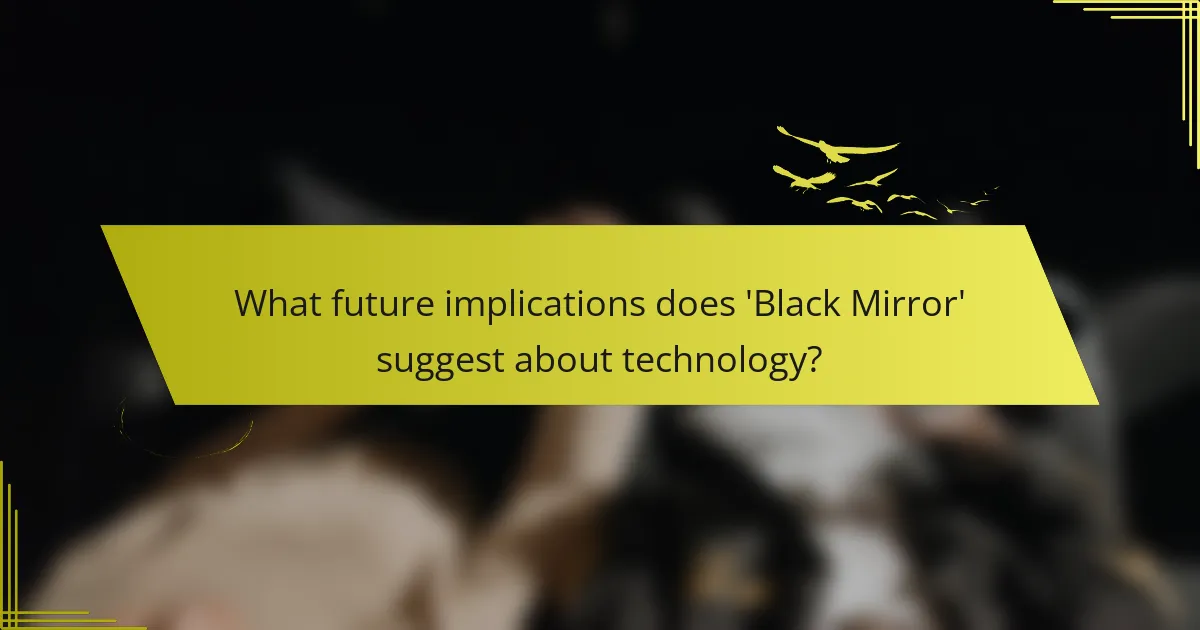
What future implications does ‘Black Mirror’ suggest about technology?
‘Black Mirror’ suggests that technology may lead to significant societal and ethical dilemmas. The series explores themes like surveillance, social media addiction, and artificial intelligence. It portrays a future where technology enhances human capabilities but also exacerbates isolation and despair. Episodes often depict the consequences of unregulated technological advancements. For instance, “Nosedive” highlights the dangers of social media ratings impacting real-life interactions. Additionally, “White Christmas” examines the moral implications of consciousness and punishment in digital formats. These narratives serve as cautionary tales about the potential dark side of technological progress.
How does ‘Black Mirror’ envision the future of human-technology interaction?
‘Black Mirror’ envisions the future of human-technology interaction as complex and often dystopian. The series explores scenarios where technology deeply influences human relationships and societal structures. Episodes depict technology as a double-edged sword, providing both convenience and significant ethical dilemmas. For instance, in “Nosedive,” social media ratings dictate personal interactions and societal status. In “San Junipero,” technology enables a virtual afterlife, raising questions about identity and existence. The show critiques reliance on technology, highlighting potential consequences like isolation and loss of autonomy. Overall, ‘Black Mirror’ serves as a cautionary tale about the implications of unchecked technological advancement.
What potential scenarios does the series predict for society?
The series “Black Mirror” predicts various potential scenarios for society, often highlighting dystopian outcomes. One scenario involves the over-reliance on technology leading to social isolation. Episodes depict characters who become disconnected from reality and each other due to virtual interactions. Another scenario features the commodification of personal data, where privacy becomes obsolete. This is illustrated in episodes where individuals’ lives are controlled by algorithms. The series also foresees a future where societal norms are dictated by digital platforms, affecting personal relationships and mental health. In addition, it explores the ethical implications of advanced technologies, such as artificial intelligence and virtual reality. These narratives serve as cautionary tales about the consequences of unchecked technological advancement and societal complacency.
How can we prepare for the possibilities presented in ‘Black Mirror’?
To prepare for the possibilities presented in ‘Black Mirror’, one must engage in critical thinking about technology. This involves analyzing how emerging technologies can impact society. Individuals should stay informed about technological advancements and their ethical implications. Participating in discussions about technology’s role in daily life is essential. Advocating for responsible tech development can influence positive outcomes. Building resilience against potential negative impacts is also crucial. Developing skills to adapt to rapid changes in technology will be beneficial. Lastly, fostering a community that prioritizes ethical considerations in tech can help mitigate risks.
What practical steps can viewers take to engage critically with technology?
Viewers can engage critically with technology by questioning its impact on society. They should analyze how technology influences their daily lives. This includes reflecting on privacy concerns and data usage. Viewers can also evaluate the ethical implications of tech innovations. Engaging in discussions about technology with others can enhance understanding. Seeking diverse perspectives on technology is essential for critical engagement. Following credible sources for technology news can provide informed insights. Finally, viewers should consider the portrayal of technology in media, such as “Black Mirror,” to understand its societal implications.
‘Black Mirror’ is a television anthology series created by Charlie Brooker that examines the dark aspects of technology and its impact on society. The series features standalone episodes that explore dystopian themes, highlighting issues such as social media addiction, privacy invasion, and the ethical implications of artificial intelligence. It serves as a social critique, reflecting contemporary anxieties regarding technology’s role in human relationships and societal norms. The article analyzes key themes, viewer responses, and the psychological effects of the series, providing insights into how ‘Black Mirror’ influences perceptions of technology and encourages critical thinking about its future implications.
